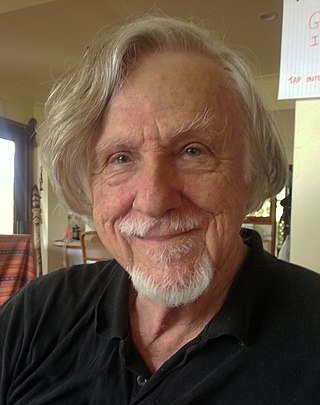Related Research Articles

The Toronto International Film Festival is one of the most prestigious and largest publicly attended film festivals in the world, founded in 1976 and taking place each September. It is also a permanent destination for film culture operating out of the TIFF Lightbox cultural centre, located in Downtown Toronto.
Telefilm Canada is a Crown corporation reporting to Canada's federal government through the Minister of Canadian Heritage. Headquartered in Montreal, Telefilm provides services to the Canadian audiovisual industry with four regional offices in Vancouver, British Columbia; Toronto, Ontario; Montreal, Quebec; and Halifax, Nova Scotia. The primary mandate of the corporation is to finance and promote Canadian productions through its various funds and programs.
Roman Kroitor was a Canadian filmmaker who was known as a pioneer of Cinéma vérité, as the co-founder of IMAX, and as the creator of the Sandde hand-drawn stereoscopic 3D animation system. He was also the original inspiration for The Force. His prodigious output garnered numerous awards, including two BAFTA Awards, three Cannes Film Festival awards, and two Oscar nominations.

Alanis Obomsawin, is an Abenaki American-Canadian filmmaker, singer, artist, and activist primarily known for her documentary films. Born in New Hampshire, United States and raised primarily in Quebec, Canada, she has written and directed many National Film Board of Canada documentaries on First Nations issues. Obomsawin is a member of Film Fatales independent women filmmakers.
Humbert Jean René Balsan was a French film producer and chairman of the European Film Academy. He was known for securing financing and distribution for diverse and often challenging films.

Josephine Hannah Chaplin was an American actress and the daughter of filmmaker Charlie Chaplin and his fourth wife, Oona O'Neill. She had a featured role in Pier Paolo Pasolini's The Canterbury Tales (1972) as May, the adulterous wife of the elderly Sir January.
The Academy of Canadian Cinema and Television presents an annual award for Best Motion Picture to the best Canadian film of the year.

Michael Dattilo Rubbo is an Australian documentarian/filmmaker.
Colin Archibald Low was a Canadian animation and documentary filmmaker with the National Film Board of Canada (NFB). He was known as a pioneer, one of Canada's most important filmmakers, and was regularly referred to as "the gentleman genius". His numerous honors include five BAFTA awards, eight Cannes Film Festival awards, and six Academy Award nominations.
The Academy of Canadian Cinema & Television presents one or more annual awards for the Best Screenplay for a Canadian film. Originally presented in 1968 as part of the Canadian Film Awards, from 1980 until 2012 the award continued as part of the Genie Awards ceremony. As of 2013, it is presented as part of the Canadian Screen Awards.

Merzak Allouache is an Algerian film director and screenwriter. His 1976 film Omar Gatlato was later entered into the 10th Moscow International Film Festival where it won the Silver Prize. His 1996 Salut cousin! was submitted to the 69th Academy Awards in the category of Best Foreign Language Film. He is one of the most influential Algerian filmmakers, considered by some to be the most important. He is the only Algerian filmmaker who devoted most, if not all, of his cinematic work to his native country.
The Rowdyman is a 1972 comedy film with moralistic overtones, set in Newfoundland. It was written by and starred native Newfoundlander Gordon Pinsent.

Taking My Parents to Burning Man is a 2014 Canadian documentary film directed by Joel Ashton McCarthy and Bryant H. Boesen that follows the latter's adventures with his 60-year-old parents at Burning Man. It provides a behind-the-scenes look at the preparation, journey and adventures at the "least-likely family vacation imaginable."
Love at First Sight is a 1976 Canadian romantic comedy film directed by Rex Bromfield.
Chapelle Jaffe is a Canadian film, television and stage actress. She is most noted for winning the Canadian Film Award for Best Actress in a Non-Feature at the 29th Canadian Film Awards in 1978 for the television film One Night Stand, and receiving a Genie Award nomination for Best Supporting Actress at the 3rd Genie Awards in 1982 for The Amateur.
For Better or For Worse is a Canadian comedy film, directed by Claude Jutra and released in 1975. The film centres on a day in the life of Bernard (Jutra) and Hélène, a married couple in middle age whose relationship has grown stale, but who reach a renewed understanding and appreciation of each other after a fight brought on by Bernard's mistaken belief that Hélène is having an affair.
Proxyhawks is a Canadian drama film, directed by Jack Darcus and released in 1971. It starred Darcus and Susan Spencer as a married couple living on a ranch in British Columbia, whose relationship tensions and difficulties are sublimated into their care of animals; the wife keeps rabbits, while the husband threatens the safety of the rabbits by taking up falconry.
When Tomorrow Dies is a Canadian drama film, directed by Larry Kent and released in 1965. The film stars Patricia Gage as Gwen James, a housewife trapped in an unfulfilling marriage to Doug, who returns to university and embarks on an extramarital affair with her professor Patrick Trevelyan.
References
- ↑ Gerald Pratley, A Century of Canadian Cinema. Lynx Images, 2003. ISBN 1-894073-21-5. p. 210.
- 1 2 J. Edward Fox, "Peter Bryant's The Supreme Kid". Cinema Canada , February 1977.
- ↑ Michael Walsh, "Supreme Kid's a downer". The Province , February 17, 1977.
- ↑ Les Wedman, "Making a splash in Canadian films". Vancouver Sun , May 2, 1974.
- 1 2 Les Wedman, "Hope reigns supreme, kid". Vancouver Sun , July 9, 1976.